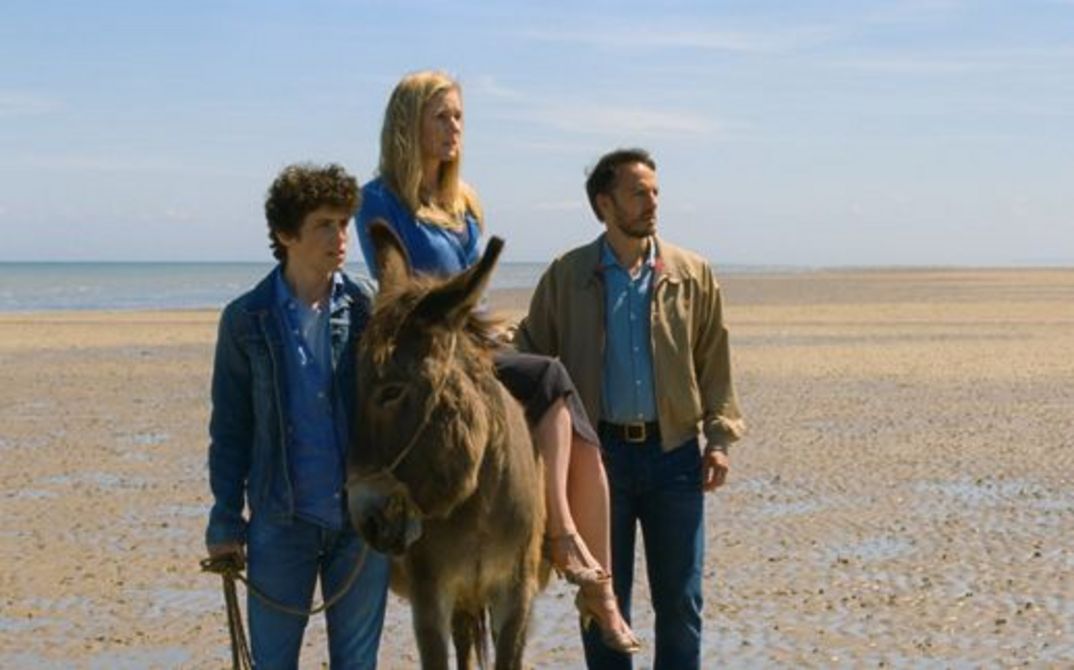LE FILS DE JOSEPH (Son of Joseph, France/Belgium 2016, 3.11., with guest Eugène Green & 9.11.) After growing up with his single mother, 15-year-old Vincent sets out in search of his father over the course of one Parisian summer. His investigations lead him to a famous publisher and ultimately to his brother Joseph, who becomes his spiritual guide. “Eugène Green drops biblical motifs – Abraham and Isaac, Mary and Joseph – into this genuinely contemporary setting as if it were the most natural thing in the world, augmenting them with nods to crime films and Italian Baroque music (…) A film where divine seriousness rubs up against bizarre comedy, where theology meets caricature, an intriguing film, anachronistic and innovative in equal measure.” (Birgit Kohler)
A RELIGIOSA PORTUGUESA (The Portuguese Nun, France/Portugal 2009, 4.11., with guest Eugène Green & 11.11.) Julie de Hauranne, a young French actress of Portuguese descent, travels to Portugal for the very first time: she is supposed to play the leading role in a literary adaptation of a 17th century epistolary novel about a Portuguese nun and her love for a French officer. While she explores the city of Lisbon by night, she becomes aware of a nun who prays daily in a chapel on a hill. This is just the start of a whole series of fateful meetings.
TOUTES LES NUITS (Every Night, France 2001, 5. & 9.11.) 1967 in rural Aix-en-Provence: school friends Henri and Jules are preparing for their final exams and dream of a future dedicated to art and nothing else. Then Henri falls in love with Émilie (Christelle Prot, from this point on an indispensable present in Green’s cinema), the wife of his coach, and absconds with her to New York. Back home, Jules experiences the turmoil of ’68. The friends lose touch with one another, but remain connected via Émilie. Green depicts twelve years in the lives of his protagonists as one rousingly epic flow, as a fascinating mosaic of characters and life plans that become inextricably linked with the events of their time. LES SIGNES (The Signs, France 2006) will be shown beforehand: in a small harbor town, a woman has been waiting for years for her husband to return, who apparently disappeared at sea.
LA SAPIENZA (France/Italy 2014, 6. & 12.11.) On the banks of Lago Maggiore, middle-aged couple Alexandre and Aliénor come across siblings Goffredo and Lavinia: the former two weary from the routine nature of the careers and the monotony of their lives together, the latter duo full of youthful, infectious enthusiasm for art, above all the architecture of Francesco Borromini. In majestic images and switching between stylistic registers in unpredictable fashion, Green tells a tale of how the harried modern spirit becomes increasingly immersed in the timelessness of thoughts and dreams. CORRESPONDANCES (France/South Korea 2009) will be shown beforehand: in this commission for the Jeonju International Film Festival, Green stages an electronic letter exchange between a woman and a man, creating a “mini-film” that was later combined with others by Harun Farocki and Pedro Costa to form an omnibus film.
LE MONDE VIVANT (The Living World, France/Belgium 2003, 7. & 10.11.) Green’s second feature established his reputation as an eccentric, formally radical, and humorous auteur. He has perhaps never been as playfully anarchistic again as in this gem, which is set in the Middle Ages, but constantly breaks the illusion of the past thanks to jeans, modern expressions, and intellectual insider gags such as those involving the “Lacanian witch”. The Chevalier au lion and the young Nicholas want to free the land from a child-eating ogre, whose wife loves the Chevalier and thus helps him in the duel against her husband. LE NOM DU FEU (The Name of Fire, F 2002) will be shown beforehand, which was already shown together with LE MONDE VIVANT on its original theatrical release: a patient confesses to his doctor that he’s a werewolf and suggests that she be present at his transformation.
LE PONT DES ARTS (The Bridge of Arts, France 2004, 7. & 10.11.) Sarah sings in a baroque quartet, Pascal studies at the Sorbonne. He hears her singing and sets out in search of her. Green depicts an intensive, piercing ode to the love between two people who are never able to meet. “One scene from LE PONT DES ARTS shows central representatives of the younger generation of directors, such as Bertrand Bonello, Mathieu Amalric, Serge Bozon, and Axelle Ropert, who follow the acting of a Japanese Nô play with total concentration: as if Green wanted to say that it’s necessary to return to the essential, to that which lies beyond short-lived cinema trends”. (Christoph Huber)
EN ATTENDANT LES BARBARES (Waiting for the Barbarians, France 2018, 8. & 14.11.) Green’s most recent feature was created as the conclusion of a workshop for actors given at renowned acting school Les Chantiers Nomades. Six people seek protection in the house of a witch and wizard couple from the advancing barbarians, whose arrival is imminent according to social media. COMO FERNANDO PESSOA SALVOU PORTUGAL (How Fernando Pessoa Saved Portugal, Portugal/France/Belgium 2018)will be shown beforehand: in the 20s, poet Fernando Pessoa developed an advertising slogan for the drink Coca-Louca, which plunged the authoritarian government of the time into total panic.
FAIRE LA PAROLE (Making the Word, France 2015, 8. & 13.11.) Green’s first documentary bears witness to his ongoing engagement with Basque culture and its language, which is the oldest in Western Europe. He followed four adolescents from the Basque Country over one summer as they explore their homeland. On their journeys, they come across people fighting against the encroaching disappearance of their cultural identity in times of tourism and globalization as well as the vitality of the Basque language, whose archaic richness of tone carries history within it as well as serving as a means of self-discovery. (gv)
An event with the friendly support of the Institut français.



